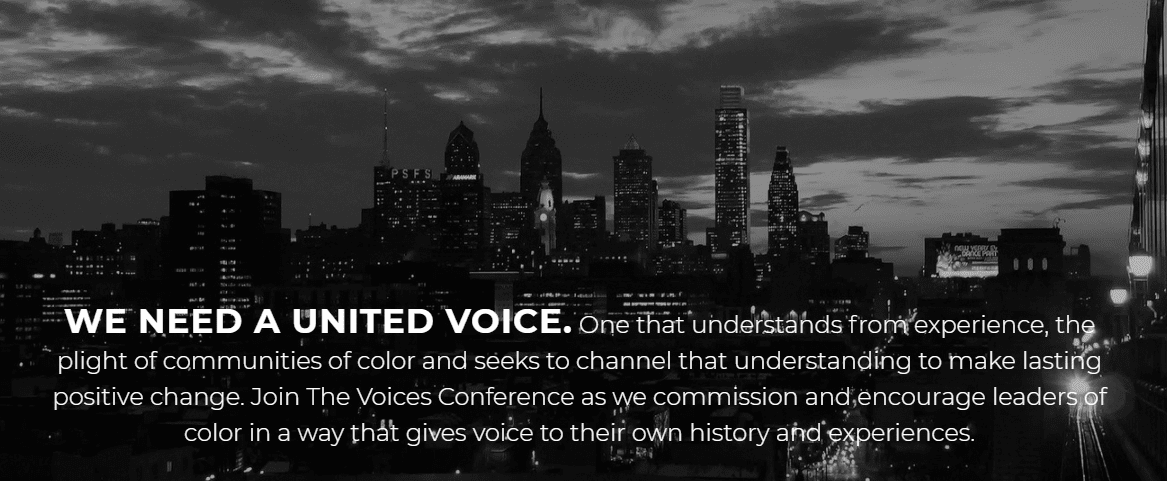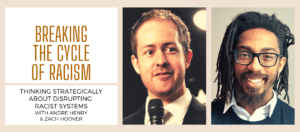Leroy Barber answers questions about the upcoming Voices Conference.

What is the Voices Conference?
The Voices Conference is an outgrowth of the Voices Project, whose mission is to affect culture by training and promoting leaders of color.
As we entered into our ninth year this year, we decided we would try something different. Because of our growth and because of the many requests we’ve received, we decided to host a larger conference as opposed to our usual small gathering of 20-30 leaders.
Little did we know that a larger conference, done specifically for leaders of color, would create so much discomfort for many of our Anglo brothers and sisters.
Why a conference specifically focused on people of color?
The conference is shaped around leaders of color, and the unique challenges that we face as leaders. That doesn’t exclude white folks, but it does shift the center away from a white perspective. So it can feel like exclusion, for people from a majority culture who are used to being centered.
The white community doesn’t realize how much “caretaking” people of color have to do on an everyday basis, and the cost this takes on people of color. This includes white leaders who have people of color on their staff. What is often missed or overlooked is the gift that staff of color give everyday by teaching even their “bosses.”
We are reversing that for this conference.
But what about white allies?
I know many white folks feel like the Voices Conference might (could? should?) be an opportunity to “teach us” how to be allies. Perhaps you identify as a ‘woke’ white leader, and want to empower leaders of color in your context, so you want to come to the Voices Conference and have us teach you how to do that. While we definitely want white allies, the conference is not designed to be an educational opportunity for teaching white people. It is built to encourage leaders of color. There is a difference.
All are welcome to attend, but folks should know at the outset that the purpose of the conference is not white education. It will not be focused, at all, on teaching whites.
Is the conference just a place to stir up racial anger and antagonism?
Some folks have raised the question about anger, and the question has come from a few different places. It has come from whites who suspect that anyone going to the conference will come back “angry” at their white friends and leaders. It has come from people of color who see such gatherings as a place to fuel anger against whites. It has come from people of color in inter-racial marriages who have questioned whether they are welcome because their spouse is white.
Here’s the thing: by not centering whiteness, it can bring up feelings of anger and disillusionment around the experiences of leaders of color. Many times, these feelings surprise the leaders of color themselves. The Voices Conference is not about pushing anger, but acknowledging different perspectives—and sometimes that process itself uncovers an anger or hurt that has long been buried or suppressed.
The Voices Conference is a setting where anger has a place in the process, yet is understood instead of dismissed. We are not always angry. We are sharing our perspectives. And for some, for the first time, these perspectives are not add-ons to the main message. That actually brings me joy.
Are you trying to replace white leadership?
Calling for white leaders to be replaced by leaders of color makes a lot of people uncomfortable, and continues to be a place of tension in many organizations. But we must realize that the white perspective is overrepresented in many industries. There isn’t much to argue there.
The question is, when will we see this tide turn? The idea of “working yourself out of a job” has been spoken over and over again, yet very few white folks work themselves out of jobs. In fact, many leaders replace themselves with other white leaders. While I don’t buy into the “pie” myth, I do recognize that to correct the present imbalance, leaders of color are going to need to replace white leaders.
I don’t think enough time, energy, and or resources have concentrated on leaders of color. And I think a community or work environment where most of the people you serve are people of color should be led by a person of color. Unfortunately, many white folks still think they are better, in many cases, for this work—and they simply are not. They merely have the resources and privileges that put them in charge.
I know many white leaders would like to think of themselves as the kind of white leaders that ought to be kept around. So a big part of me wonders, if they stay around, is there a way for leadership of color to emerge? If that emergence is going to happen, we must have things like the Voices Conference.
Isn’t this conference a little slanted and/or biased?
The field is slanted, my friends, towards white people in general. Some white evangelicals are having conversations about the church and how they feel like they are in exile. This is fascinating, because it makes the assumption that the “church” is their experience, and not the experience of people of color who have lived in struggle and exile for generations.
The Voices conference comes to the table and assumes people have been in struggle for a very long time, and looks at how leadership emerges from a place that was not designed for you to inhabit.
How do I sign up?
If you are considering signing up for the Voices Conference, please know that everyone is welcome—but that the conversations, speakers, labs, and atmosphere are built for marginalized people.
We welcome everyone to this place where we will sit on sacred ground, established by black leaders who believed that God was present with them even though they were not being treated equally. Even though so many things are stacked against their success, we believe that God is moving powerfully through leaders of color.
Leroy Barber has dedicated 30 years of his life to eradicating poverty, confronting homelessness, restoring local neighborhoods, healing racism, and living what Dr. King called “the beloved community.” Leroy is co-founder of the Voices Project and adjunct professor at Kilns College and Multnomah University. He is the author of four books: New Neighbor: An Invitation to Join Beloved Community, Everyday Missions: How Ordinary People Can Change the World, Red, Brown, Yellow, Black and White: Who’s More Precious In His Sight?, and Embrace: God’s Radical Shalom For A Divided World.


